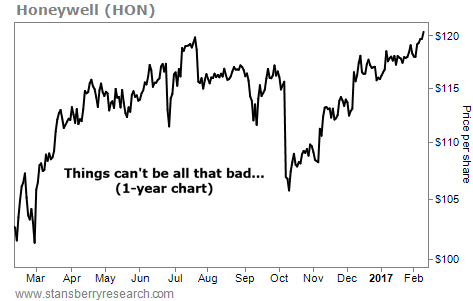| Home | About Us | Resources | Archive | Free Reports | Market Window |
How to Buy Real Estate 'Right'By
Friday, February 10, 2017
Want to know the secret to making a fortune from real estate?
Buy right.
It's not actually a secret. Almost any good book on the subject will tell you that. The problem is 90%-plus of those who invest in real estate have no idea what "buying right" means.
To many people, it means buying property when real estate prices are going up. That, as a practice, sometimes works. But as a strategy for getting wealthy safely? It is a very, very bad one.
The first property I invested in seemed very "cheap" when I bought it back in the late 1970s. It was a nice little Washington, D.C. apartment in a refurbished building. The landlady convinced me to buy it by showing me how much prices had been escalating.
She told me that if I bought this unit "now," I'd stand to make a lot of money as it appreciated. To make it even easier, she got me a loan from some bank that required nothing down besides a few thousand dollars in closing costs.
When my wife and I signed the mortgage and got the keys, we felt like we had made a really good deal.
But real estate in Washington D.C. was bubbling up in the mid-1970s, and lots of people who didn't know a thing about real estate were jumping in. Including me.
It took me years to finally get rid of that first apartment (and the deadbeat who was renting it from me). And it cost me about $30,000 to boot.
I made many mistakes in that one transaction. But for today, I want to focus on just one: buying rental real estate without any idea of what a "good buy" really is.
When it comes to rental real estate, a good buy is getting the title to a property that can be fixed up and rented out at a profit right from the outset.
So what exactly does it mean to buy rental real estate "right"?
My answer is this: If you can buy a piece of property and have it fixed up and ready to rent for less than eight times yearly rent, you are almost certainly "buying right."
Let me show you a specific example...
Let's say the house you rent in your neighborhood costs $1,500 per month. That would be $18,000 in rent each year ($1,500 x 12 months). As an investor in rental real estate, that means you should not pay more than $144,000 (8 x $18,000) for it.
This is a ballpark rule of thumb, of course. But I've been investing profitably in real estate now for over 30 years (that first investment was my only loss), so I can say confidently that it's reliable.
If you can buy rental property at that ratio, you stand a good chance of making about 8%-10% on your money if you buy the property with cash.
This ratio I just told you about is called a gross rent multiplier (or GRM).
Eight times yearly rent is the maximum you should pay for any rental property. If you live in an area that has high property taxes and home insurance, a GRM of 7 is a better bet. Your goal is always to pay the lowest GRM you can find.
The big point here is that when you invest in rental real estate, you should be investing for cash flow, not appreciation. Your objective should be to start making cash profits on your investment in the very first year.
Be aware: You can't always find rental properties for a GRM of 8 or less. There are places where either rents are too low or property prices are too high... or both. These are places you should not invest in rental real estate.
There are also times when it is impossible or nearly impossible to buy rental real estate "right." You certainly couldn't have bought rental real estate for a GRM of 8 in Florida, California, Texas, and other populous states in 2007 and 2008. The cost of property back then was too high compared to their rent rolls.
But I want to stop here and reiterate the basic point I have been making. Buying cheap does not mean buying property when it "seems" cheap – either because it is shooting up or because it is cheap compared with what it was before.
The No. 1 rule to always follow is to buy rental property when you can get it at GRMs of 8 or less. If you do that, you'll stand a great chance that your property will generate cash flow as long as you manage it well.
Regards,
Mark Ford
Further Reading:
"Compared with Shanghai and Vancouver, they're practically giving away houses in Florida," Steve writes. Home prices are cheap in America right now. But if you wait too long to invest in real estate, you might miss your opportunity. Get the full story here.
"Wouldn't it be nice to wake up one day and realize you don't need to work anymore?" Mark writes. "You can make it happen by building a substantial real estate retirement portfolio." In his essay, he explains how real estate can help you beat the stock market and retire with multiple income streams. Read more here.
Market NotesAMERICA'S ECONOMY CHUGS ALONG Today's chart highlights the strength of an American manufacturer...
Regular readers know we look at several sectors that tell us what's going on in the U.S. economy. In the past, we've discussed how big banks and shipping and retail companies help us gauge economic strength. And the manufacturing sector does, too.
Today, we're looking at a "bellwether" of the sector: Honeywell (HON). The $90 billion giant employs nearly 130,000 people around the world – including nearly 50,000 people in the U.S. – and produces a wide range of products for the airline, automotive, chemical, construction, and medical sectors.
Honeywell shares are up since the election. Investors are betting that increased infrastructure spending from President Trump will boost the company's profits. Its shares are up around 20% from last year's February lows... And they just reached a fresh 52-week high. If manufacturers are hitting new highs, "things can't be all that bad" today...
 |
Recent Articles
|



